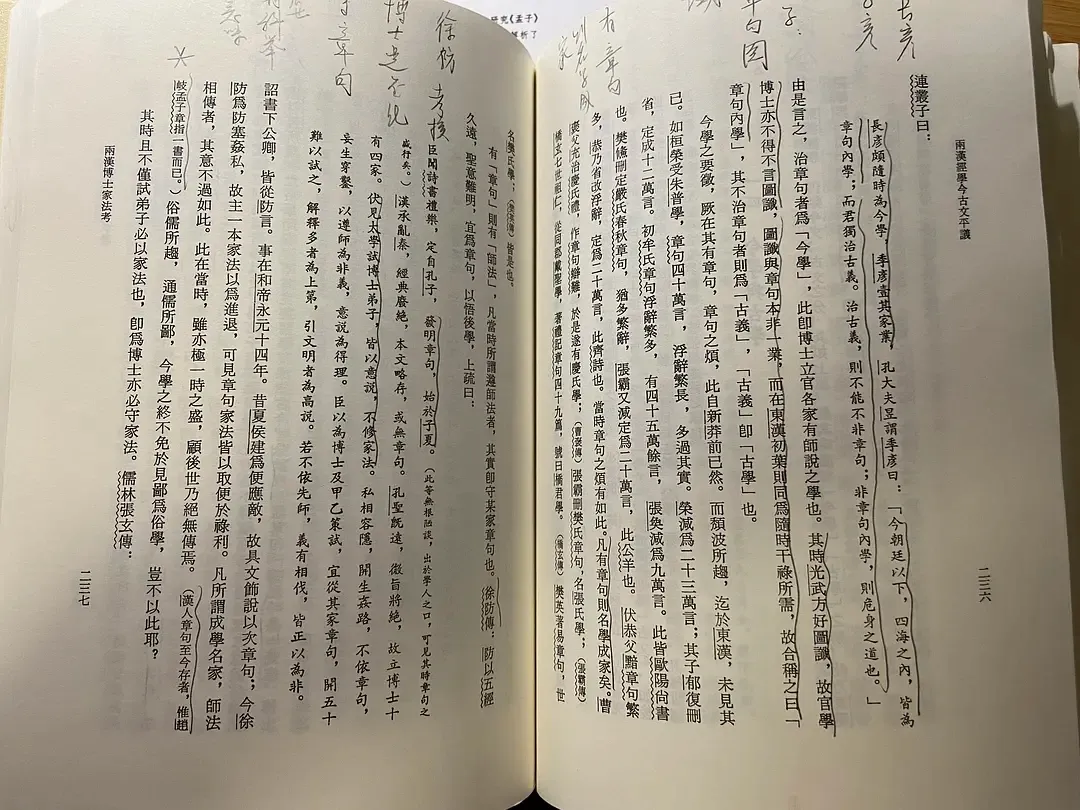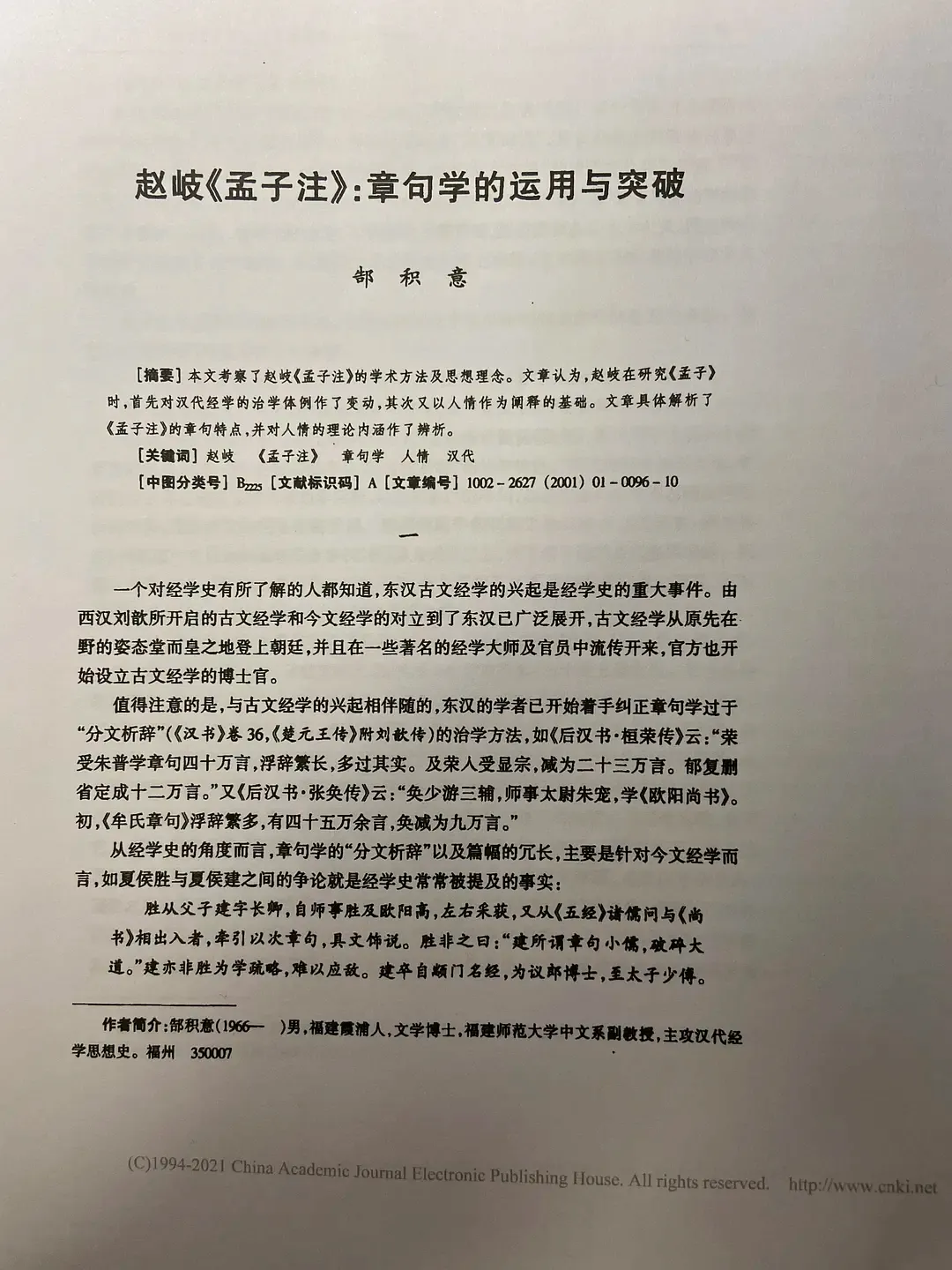【Notes】Family Law of Classical Studies in the Han Dynasty
The first thirteen sections of the eighteen sections of Qian Mu's "Doctoral Family Law Examination of the Two Han Dynasties" are taken from the author's "History of Qin and Han Dynasties" (according to "Chronology" because "History of Qin and Han Dynasties" should be the first), whether it is the quotation of historical materials or the author's discussion , there are many repetitions. The following sections discuss the study of the Eastern Han Dynasty, which is beyond the scope of the "History of the Qin and Han Dynasties", and may be a special supplement to make this topic complete.
One of the core points of the "Family Law Examination" is that the so-called "family law" in the classics of the two Han Dynasties is actually the study of chapters and sentences. Only with chapters and sentences can a school be established. The so-called chapters and sentences are to divide the scriptures or transmissions into chapters according to the textual meaning, and to make exegesis and explanation of names and objects for each sentence in each chapter, and it can also involve the invention of meaning. The only surviving achievements in the study of chapters and sentences in the study of classics in the Han Dynasty are the chapters and sentences made by Zhao Qi for the "Mencius".
An important reason for the rise of Zhangyu after the middle of the Western Han Dynasty was to meet the needs of Confucian scholars to understand the classics and apply them, and it was convenient for scholars who had mastered the classics to better deal with their opponents. . Xiahousheng, the master of the "Shangshu", a small Xiahou who was established in the Xuandi Dynasty, believed that it would be difficult to confront the enemy when he did not communicate the meaning of the scriptures sentence by sentence. That is to say, learning the chapters and sentences by the students is equivalent to being in a state of combat readiness at all times, and can be better aligned with the outside world. Another effect of advocating chapter studies is to better manage doctoral students. Xu Fang of the Eastern Han Dynasty wrote a letter and suggested that doctoral disciples should be strictly assessed according to the chapters and sentences, so that they should strictly abide by the family law and not invent arbitrarily. Xu Fang's argument is obviously only possible when the study of chapters and sentences has developed to a certain extent and the family law has already been formed.
The prosperous chapters and sentences were originally intended to be used in the passage of the classics, but it has developed to the end, and it has become very cumbersome and long, so that there is an extreme example of Qin Yanjun saying "Yue Ruojigu" to 30,000 characters, which makes the students of the classics tired of memorizing chapters and sentences. It has become impossible to apply the scriptures. Qian Mu believes that there are many ancient and difficult places in the classics, and the chapters and sentences must explain these difficulties one by one. In the early days, the study of classics was simple. It is unavoidable to search extensively in the Five Classics, and it is inevitable to forcibly explain where it is difficult to explain, which makes the chapters and sentences difficult. Gao Jiyi analyzed Zhao Qi's "Mencius Chapters" and believed that there must be many simpler places in a scripture, and the chapter style requires that these parts be explained one by one, which will cause the chapters and sentences to be complicated. It is complicated and repeated, so we can imagine the situation where the chapters and sentences develop to the end.
Another important point of the "Jiafa Kao" is that the term "modern and ancient texts" is not suitable for summarizing the actual situation of the development of classics in the two Han Dynasties, because whether the classic texts and theories are modern or ancient has never been the focus of Han Confucian disputes, even if it is A scholar of "ancient literature" like Liu Xin would not think that the studies of classics, which had previously been established by academic officials, were some kind of late learning. What Han Confucianism argues is "modern and ancient learning". Modern learning refers to chapters and sentences, while ancient learning refers to the simple style of study that survived in the early Western Han Dynasty. It is precisely in order to solve the problem of complicated and cumbersome chapters and sentences that the scribes of the Eastern Han Dynasty raised the banner of ancient learning and advocated a simple, convenient and practical style of study. Therefore, Ban Gu believes that the predecessors only had the necessary exegesis to manage the scriptures, and there was no obstacle to the cumbersome chapters and sentences, so they could ponder the scriptures, study the scriptures in three years, and go through the five scriptures when they reached the age of 30. Today, people are under the heavy pressure of chapters and sentences, and they only have enough to learn in a lifetime. A classic, through a family of knowledge. The White Tiger View Conference that Ban Gu participated in was precisely to use ancient learning to solve the problem of chapters and sentences.


Like my work? Don't forget to support and clap, let me know that you are with me on the road of creation. Keep this enthusiasm together!

- Author
- More